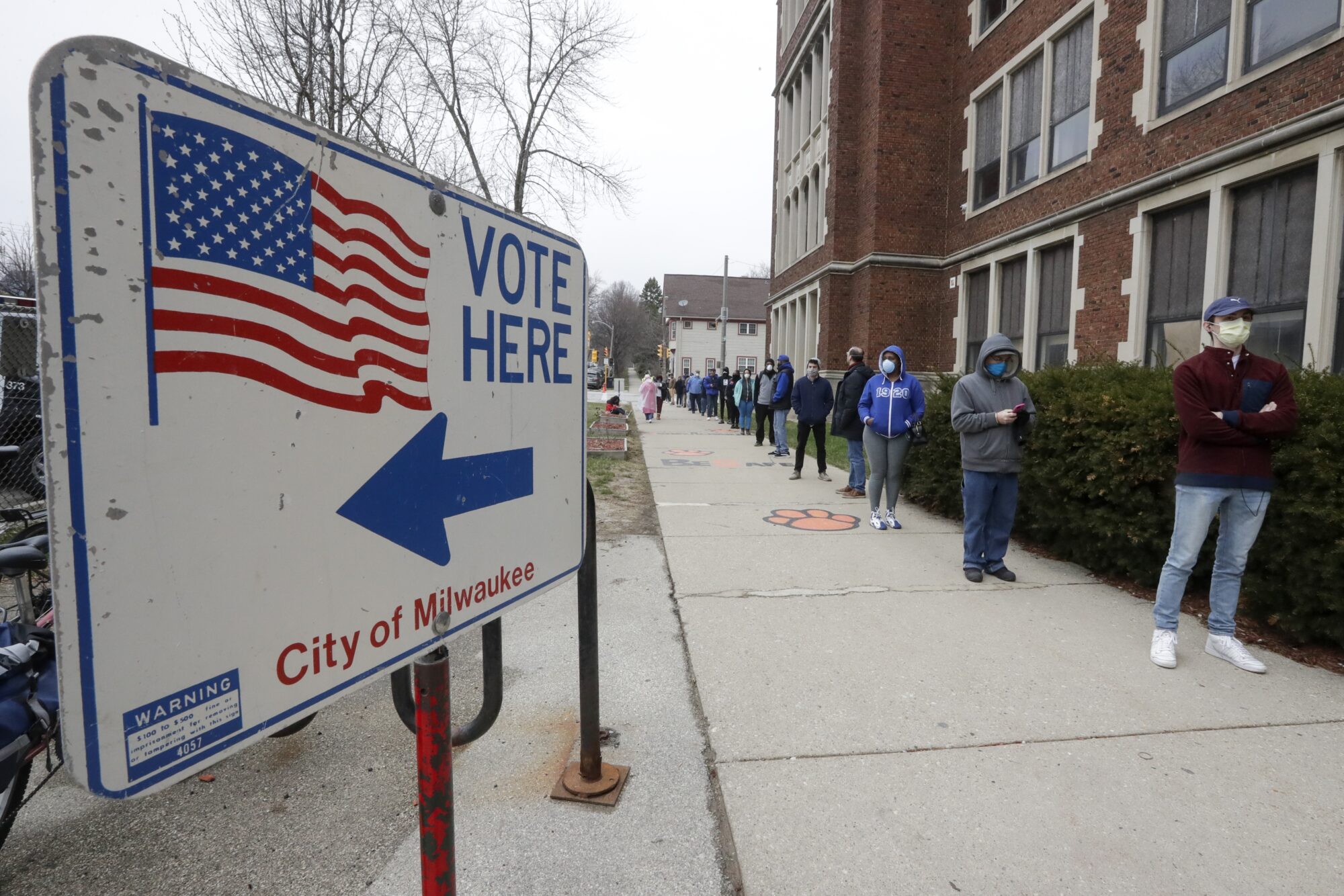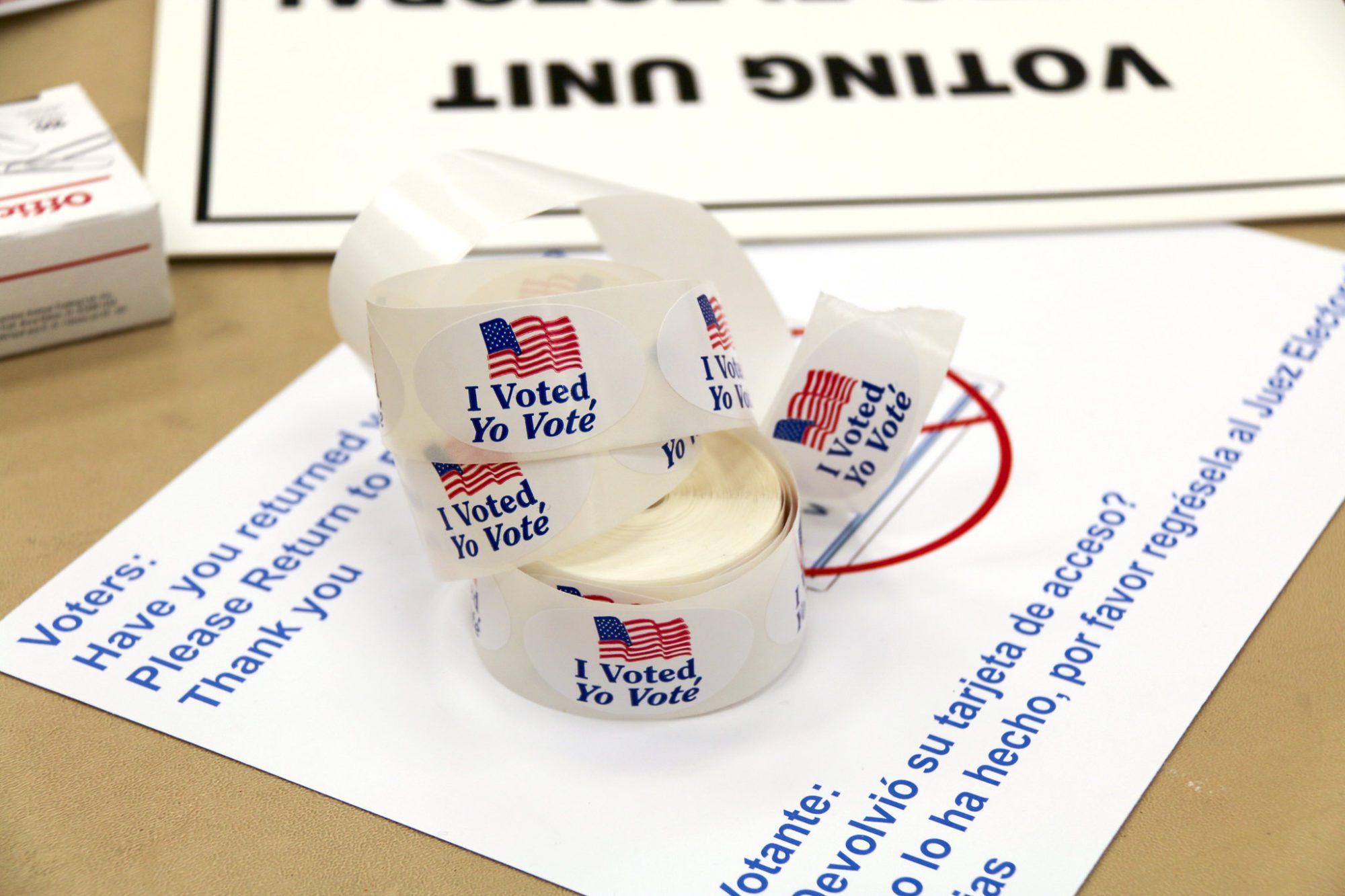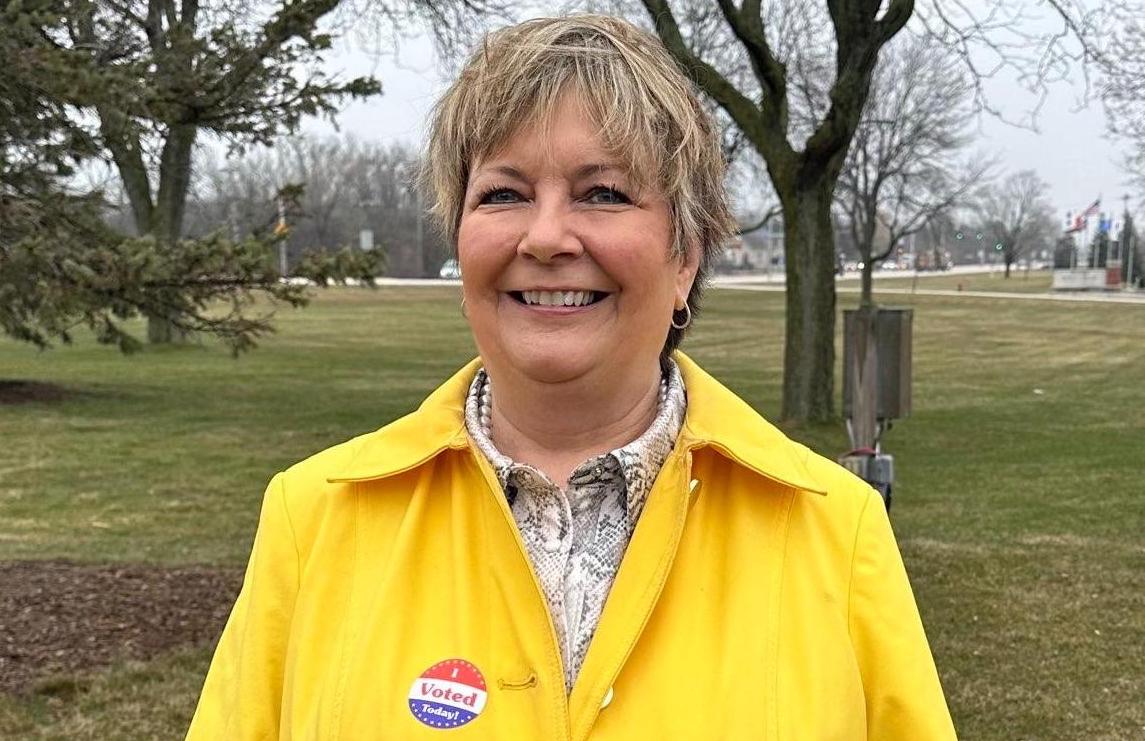Wisconsin’s Election Office In Limbo After GOP Tries To Force Out Its Director
Meagan Wolfe has been the target of GOP Big Lie conspiracies. Democrats are now using a court ruling they previously decried to keep her in office past the end of her term.
Cameron Joseph | July 27, 2023


The job of Wisconsin’s top election official is in limbo following a conspiracy-fueled attempt by Republicans to remove her from office, leaving an unstable situation that could hurt the state’s readiness for the 2024 elections no matter the outcome.
As the administrator of the Wisconsin Election Commission, Meagan Wolfe is the nonpartisan manager of the office that advises and aids Wisconsin’s 72 county clerks and nearly 2,000 local election officials.
Wolfe is widely respected by local clerks and election experts from both parties. But she has become a target for right-wing conspiracy theorists touting false claims that the 2020 election was stolen from former President Donald Trump, and Republican lawmakers who want to appease their base have turned her into a convenient scapegoat.
After state senate Republicans made clear earlier this summer that they were unlikely to confirm her for another four-year term, the commission’s Democrats moved to block a procedural step to allow that vote to happen at all. Now, to keep Wolfe in office past her term expiration on July 1, Democrats are banking on the courts to uphold the precedent of a controversial ruling that they had decried and Republicans cheered just a year ago.
This unprecedented and unpredictable situation is the result of Republicans’ yearslong attacks on the state’s election governance—and could undermine Wisconsin’s ability to run a smooth election in 2024, when it could well be the state to determine the next presidential election.
Wolfe’s employment status will likely be decided at the state supreme court—which is set to flip to a liberal majority on Aug. 1—adding another layer of uncertainty and practically ensuring that the process will drag on for months before any resolution.
Republicans’ barrage of partisan attacks on Wolfe and her office have already depleted staffers’ morale and could lead to a staff exodus that saps the office of crucial institutional knowledge ahead of what will be a supercharged presidential election in a crucial battleground state. Two sources told Bolts that the Wisconsin Election Commission’s head of information technology recently announced she was leaving—and they’re worried others may decide to depart as well.
“My fear is that the uncertainty around Meagan is going to create uncertainty around her staff and what their future could look like. Some of them have already been through a ton, just like all of us, with 2020. And maybe this might just be the last straw,” Milwaukee County Election Commission Executive Director Claire Woodall-Vogg told Bolts. “That really scares me.”
And there’s no good solution in the offing.
If Wolfe is forced out, the commission will have to scramble to find an adequate replacement for a highly specialized, incredibly difficult, and closely scrutinized job that few competent administrators would want given the partisan fury that it draws. But if the courts rule that Wolfe can stay in her job through the next election even though her term has expired, it gives Republicans an easy foil if they narrowly lose the state’s presidential election next year.
“Either way, we’re screwed,” warned Jay Heck, the executive director of the good-government group Common Cause’s Wisconsin chapter.
A Badgered State
The fight over Wolfe’s reappointment is just the latest dust-up in a long-running battle over election administration in Wisconsin. Republicans have been crying foul over the state’s election system for years, using their gerrymandered supermajorities in the state legislature to repeatedly change the rules and oust nonpartisan officials they thought were biased against them. That partisan sniping got supercharged during and after the 2020 election, when many embraced President Trump’s claims that the state’s election had been stolen from him in spite of numerous investigations that proved that was false.
This tension began building more than a decade ago. In 2007, following a bipartisan legislative campaign finance scandal, lawmakers of both parties teamed up to create a Government Accountability Board (GAB) composed of retired state judges to oversee the state’s elections.
That board drew national praise from good-government groups for its nonpartisan setup, which—unlike many states where elected or appointed partisans run elections—helped inoculate it from the day’s politics. But Republicans became disenchanted, then furious, when the board approved an investigation into whether then-Governor Scott Walker, a Republican, illegally coordinated with outside groups during his 2012 recall election. That investigation dragged on for years before it was ended by a controversial decision by the conservative-dominated Wisconsin Supreme Court in 2015.
Walker and Republican lawmakers soon passed legislation to dissolve the board and replace it with the Wisconsin Election Commission. It was modeled in part on the Federal Election Commission, with three appointed Democrats, three appointed Republicans and a majority required to make any decisions—meaning that it was designed to deadlock on controversial issues.
The commission’s first administrator was a holdover from the GAB, and Republicans accused him of favoring Democrats, pushing him out of that role at the beginning of 2018 as part of a flurry of partisan power-grabs right before Walker left office after losing to Democrat Tony Evers.
Wolfe was, at the time, Republicans’ choice for an administrator they thought would treat them fairly. She had already spent years working for the state on elections at that point, first at GAB then WEC, and was promoted to interim administrator by a unanimous vote by the committee’s six members that spring.
The GOP-run Senate unanimously confirmed her to a full four-year term a year later.
Since then Wolfe has earned accolades from local election clerks from across the political spectrum.
“I couldn’t tell you whether she’s a liberal or conservative in all the years I’ve worked with her,” former Wisconsin Republican Sen. Kathy Bernier, a former local election clerk who regularly worked with Wolfe during her time in the legislature, told Bolts.
Fond du Lac County Clerk Lisa Freiberg, a Republican, said Wolfe “puts everything and more” into the job.


But Republican legislators were enraged that the commission, in response to the COVID-19 pandemic, expanded voting procedures for the 2020 presidential election—and the commissioners and Wolfe soon became targets of conspiracy theories that they had intentionally rigged the election against Trump.
One specific policy changing nursing home voting practices became a central theme of the GOP conspiracy theory that the election was stolen. Wisconsin law mandates that voting deputies are supposed to visit nursing homes to help residents vote and make sure everything is on the up-and-up, but because most nursing homes banned all visitors during the peak of COVID-19, the commissioners waived that rule and encouraged absentee mail voting instead.
Racine County’s Republican sheriff claimed intentional voter fraud, alleging that a handful of nursing home residents who had been declared incompetent to vote by judges had cast ballots anyways. The county’s Republican district attorney declined to bring charges but many Wisconsin Republicans still accused the commissioners of willfully misinterpreting the law .
President Trump soon added the allegations to his conspiracy fodder, falsely claiming that Wisconsin nursing homes had sent in “thousands and thousands and thousands of crooked votes” in campaign speeches.
Republicans even went after their own committee members, bullying GOP commissioner Dean Knudson into stepping down from the commission for, in their view, siding too often with Democrats. They replaced him with Wisconsin Elections Commission Chairman Don Millis.
And they turned on Wolfe as well. Chris Kapenga, the Republican Senate President, demanded in late 2021 that Wolfe and all of the WEC’s commissioners resign.
Michael Gableman, the archconservative former state supreme court justice who was commissioned by Republican legislative leaders to investigate the 2020 election, and who repeatedly pushed false conspiracy theories as part of that process, called for the commission to be dismantled. And he singled Wolfe out for her appearance.
“Black dress, white pearls—I’ve seen the act, I’ve seen the show,” Gableman said during a 2022 radio interview, comparing Wolfe’s outfits to Hillary Clinton’s.
But Wolfe was not even a member of the commission. Her job was to carry out the decisions determined by its members, all while providing guidance to local officials, helping them overcome challenges, making suggestions and implementing the commissioners’ instructions as they tackle any policy decisions and legal interpretations themselves.
“All the complaints that I’ve heard about drop boxes, special voting deputies, all of that—none of those were Meagan’s decision,” Millis told Bolts. “My concern is that she has become a lightning rod for people who are angry with the decisions of the commission.”
Putsch and Shove
It became clear this spring that state Republicans wanted Wolfe gone by the end of her term in June.
According to state law, the commission gets to select an administrator, but the Senate must then confirm them. Kapenga told the Associated Press in mid-June that “there’s no way” that the Senate would vote to give her another term. He promised he would “do everything I can keep her from being reappointed.”
Wolfe responded in an open letter to Wisconsin’s election clerks in mid-June making the case for why she should get another term.
“It’s clear that enough legislators have fallen prey to false information about my work and the work of this agency that my role here is at risk,” she wrote. “There is no substitute for my decade-plus of experience in helping run Wisconsin elections at the state level. It is a fact that if I am not selected for this role, Wisconsin would have a less experienced administrator at the helm.”
To help Wolfe stay in office, the three Democrats on the commission turned a recent supreme court precedent they strongly disagreed with to their advantage.
Last summer, the supreme court, which had a conservative majority at the time, ruled in a 4-3 decision that a Republican appointee who refused to leave office when his term ended could stay in the job indefinitely. The extraordinary ruling validated Republican efforts to stymie Evers, the Democratic governor who took office in 2019, and prevent him from installing new appointees at the head of the state’s agencies.
Democrats were furious at the time. But this summer they decided to test the precedent to let Wolfe stay in office by virtue of her prior term, rather than ask the GOP Senate to approve a new term. When the board met to vote to re-appoint Wolfe in late June, the three Democrats abstained from the vote. Even with all three Republicans voting for Wolfe, that left the commission without a majority, halting the nomination rather than sending it to the Senate.
“It’s a terrible decision. But it is a decision, right? Like, it’s the final answer on this,” Democratic commissioner Ann Jacobs told Bolts, referring to the 2022 state Supreme Court ruling. “So that appears very specifically to deal with the situation we found ourselves saying with the elections commission.”
Republicans slammed the Democratic commissioners for circumventing the normal process.
“It’s just highly hypocritical and that makes it harder to revive confidence in our elections,” Millis said.
Senate Republicans responded by essentially pretending the committee’s deadlock vote didn’t happen and voted to take up her reappointment when the chamber reconvenes in September. But their interpretation that the commission’s 3-0 vote with three abstentions meant that Wolfe’s reappointment had been approved for the Senate to review flies in the face of the law’s actual language, which requires a majority of the 6-member commission to approve, not simply a plurality, or majority of those voting.
Millis, the commission’s Republican chair, ruled that the commission’s vote to reappoint Wolfe had failed even though he supported it.
Senate Majority Leader Devin LeMahieu has privately admitted as much. He acknowledged in an email he sent to conservative activists in mid-June that was obtained by the Wisconsin State Journal that because of the state supreme court’s recent precedent, “If WEC doesn’t reappoint Wolfe or a replacement, the senate would have no power to get rid of her through the confirmation process.”
What’s Next?
It’s unclear where the process goes from here. Spokespeople for LeMahieu and Kapenga declined to make them available for an interview, or answer questions about Senate Republicans’ plans to try to remove her from office.
The most likely scenarios are that Republicans will either file a lawsuit to try to get the courts to determine that Wolfe can no longer stay in her job because the commission didn’t confirm her for another term, or they’ll try to remove Wolfe on their own with a Senate vote, in which case Democrats will go to court.
The conservative majority that ruled to allow appointees to stay in office indefinitely will no longer exist in just a few days. Liberal judge Janet Protasiewicz will be sworn in to a ten-year term she won in April, giving the court a left-leaning majority for the first time in a generation. This means that the three liberal justices, who last year ruled against allowing people to stay in office past their terms, are now in the court’s ideological majority.
But there’s no guarantee that the members of the court won’t reverse themselves now that the shoe is on the other foot. Judges can side with their side’s best political interest even if it conflicts with their prior legal reasoning. Protasiewicz has yet to weigh in on the matter.
“I will take my shots with the court, rather than at the Senate,” Democratic Commissioner Mark Thomsen said during the hearing where the Democrats abstained from voting on Wolfe’s renomination..
Jacobs, another Democratic commissioner, admitted to Bolts she does not know how the court will rule. “I don’t know the answer to that. I don’t think anyone does. We’re all just sort of dealing with this unusual situation we find ourselves in,” Jacobs said.
“It’s hard for me to predict what’s going to happen,” Millis, a Republican commissioner, said. “I have no grand strategy. This is sort of unprecedented.”
If Wolfe is removed, the six commissioners would have to execute a rapid job search for her replacement who would remain in the position for a year, likely through the 2024 elections. But the law stipulates that commissioners only have 45 days to find, hire and then vote to appoint a temporary replacement. If they fail to do so or can’t agree on a replacement, the choice would go to the Republican-controlled Joint Committee on Legislative Organization, which includes Republicans who have lobbed baseless attacks against Wolfe.
Wolfe declined to be interviewed for this story.
Freiberg, Fond Du Lac County’s Republican election clerk, told Bolts that she’d recently had a 50-minute phone conversation with Wolfe, who she considers a friend. She said Wolfe kept wondering: “Am I going to have a job tomorrow?”
But Freiberg said in spite of that uncertainty, she knew that Wolfe would continue to put “nothing less than 100 percent into her day-to-day job”—as long as she was still employed.
And if she’s forced out?
“It’s gonna be hard to find anyone qualified to do it. It is a difficult job,” Millis told Bolts. “The worst-case scenario is we’re in some sort of limbo for months.”
Correction: An earlier version of this story misstated the position that Wolfe was promoted to. She was made interim election administrator by a commission vote in 2018.
Sign up and stay up-to-date
Support us
Bolts is a non-profit newsroom that relies on donations, and it takes resources to produce this work. If you appreciate our value, become a monthly donor or make a contribution.





